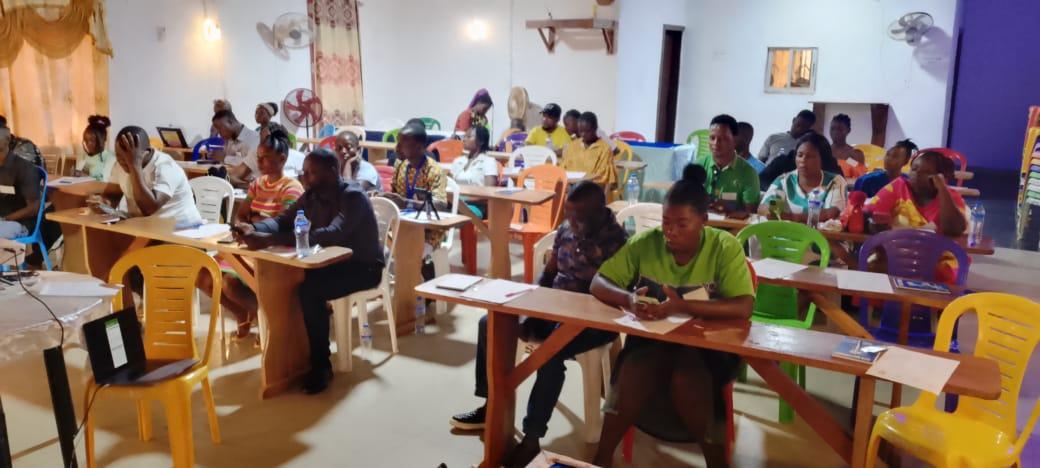Africa-Press – Liberia. In a bid to combat corruption and promote accountability in Liberia’s forestry sector, Integrity Watch Liberia has concluded a two-day capacity-building workshop aimed at training over 20 forest-dependent communities to use mobile technology for reporting unethical practices in forest management.
The workshop, held in Ganta, Nimba County, was supported by funding from the Swedish government and implemented in collaboration with the United Nations Development Program (UNDP) and the Food and Agriculture Organization (FAO).
The training focused on the use of a digital reporting platform designed to empower local communities to monitor forest activities and file corruption reports in real time.
Participants received practical, hands-on training on how to use the “Talkay Reporting App” — a mobile application developed in collaboration with the Liberia Anti-Corruption Commission (LACC) — to report misuse and mismanagement of forestry resources in their regions.
At the opening of the training, Harold M. AIDOO, Executive Director of Integrity Watch Liberia, emphasized that the initiative is part of a broader campaign to enhance transparency and accountability within the forestry sector while improving livelihoods in forest-based communities. He stressed the importance of local participation in safeguarding Liberia’s forest resources and holding government actors accountable.
“This platform is not just a tool; it is a crucial step towards empowering community members to take an active role in the governance of their natural resources,” AIDOO said. “Our goal is to ensure that ordinary people have the power and knowledge to report wrongdoing and demand accountability.”
AIDOO further explained that the Talkay Reporting App is a user-friendly mobile tool that allows community monitors to document and submit incidents of corruption directly to oversight institutions. He noted that Integrity Watch Liberia, in partnership with LACC, will provide limited financial support to local monitors to facilitate transportation and field visits needed to collect and submit data.
“The Talkay Reporting App is a powerful tool that empowers community monitors,” AIDOO stated. “Through this tool, we are not only promoting citizen engagement but also enabling real-time accountability. This is part of the Brother-Based Community Forestry Project, which aims to foster transparency and justice in forest governance.”
Joining the workshop were officials from the Forestry Development Authority (FDA), who welcomed the initiative and pledged to collaborate with trained community monitors in strengthening oversight within the forestry sector. The FDA lauded the effort as a timely intervention in curbing illegal logging and corruption in community forests.
Ernest Hughes, Vice Executive Chairperson of the Liberia Anti-Corruption Commission, also addressed participants during the training. He emphasized LACC’s commitment to acting on the reports submitted through the Talkay platform and ensuring that allegations of corruption are thoroughly investigated.
“Our team will actively monitor the various reports sent by the community participants, enabling us to follow up on corruption allegations and ensure accountability,” Hughes noted. “This is a critical step toward building a culture of integrity and empowering citizens to protect what belongs to them.”
Participants expressed deep appreciation for the training and the opportunity to become more actively involved in forest governance. Several community representatives noted that the training was the first of its kind in their regions and equipped them with practical tools to confront corruption.
“We have been waiting for an opportunity like this,” said a representative from one of the forest-based communities. “Now, we can hold those in power accountable and ensure that they give an account of any funding or benefits coming from our forests.”
The initiative comes at a time when Liberia’s forestry sector continues to face widespread allegations of mismanagement, illegal logging, and revenue diversion. Local communities, often the primary stakeholders affected by forest exploitation, have historically been left out of monitoring and decision-making processes.
By involving community members directly in oversight and providing them with the technology and training to report incidents, Integrity Watch Liberia and its partners hope to close the accountability gap and promote a culture of transparency.
As the workshop concluded, there was a renewed sense of hope among participants. Many pledged to return to their communities and share the knowledge gained, encouraging others to become vigilant and proactive in protecting their natural resources.
This community-centered approach, supported by Integrity Watch Liberia, the LACC, and international partners, represents a progressive shift in anti-corruption efforts. It reinforces the message that sustainable forest management and good governance can only be achieved when citizens are empowered, engaged, and equipped with the right tools.
For More News And Analysis About Liberia Follow Africa-Press






